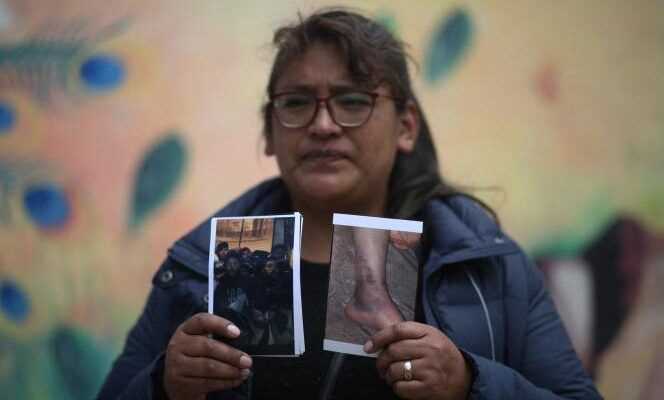She clings to the framed photo of her son, hugging it to her chest, her shoulders covered in a large black shawl. “My son came out, he told me he would be back in half an hour, but on the way he was killed, narrate in a sob Maria Condori. We don’t know what happened to him. At the health post, we saw him bloodied, a bullet had punctured his skull. He left without saying goodbye to us. ” Rudy Vasquez Condori was 23 years old, he worked in a mining company and economically supported the parental home. He was one of ten people killed by security forces on November 19, 2019 in Senkata, a district of the city of El Alto, on the outskirts of La Paz.
Along with Maria Condori, widows and other mothers, mostly young boys, murdered in what international organizations have called “Massacre” . They came together, two years after these bloody events, to demand justice and reparation. To date, a handful of soldiers and police have been placed in preventive detention in this case. None have yet been tried.
“It’s a great pain to remember that day, but people need to hear the truth. The dead are not terrorists or delinquents as the government of the day believed [dirigé par l’ex-présidente par intérim Jeanine Añez (2019-2020), en détention préventive depuis mars 2021 pour « sédition » et « terrorisme » dans l’affaire dite du « golpe » (putsch)]. They were massacred ”, Neylista Ruiz Quispe gets carried away. On her back, she carries a young child. She was pregnant when her husband was killed. They were coming out of a prenatal checkup together.
Brutal takeover
In November 2019, the country is in the throes of a major political crisis. After elections that the opposition and the Organization of American States consider tainted with irregularities, President Evo Morales is forced to resign on November 10. On the 12th, the vice-president of the Senate, Jeanine Añez, proclaims herself president in the order of succession, but without the quorum of Parliament. This self-proclamation and the first gestures that followed – his entry into the presidential palace with a Bible in his hand and the gatherings of his supporters burning the whipala, the flag symbol of a multi-ethnic nation – triggered the anger of the indigenous populations, in particular the Aymara, the majority ethnic group from which Evo Morales comes.
This November 19, 2019, while the country is plunged into violence, the inhabitants of El Alto, historic bastion of the Movement towards Socialism (MAS), the party of Evo Morales, block the entrance to the liquid gas refinery and Senkata gasoline in protest. They want to prevent the distribution of fuel to La Paz. The takeover by the police will be brutal. A decree, signed two days after Jeanine Añez took power, exempts the armed forces from criminal prosecution in the exercise of their functions. It will be denounced by international organizations as a ” license to kill “.
You have 52.1% of this article to read. The rest is for subscribers only.
